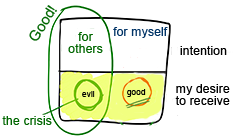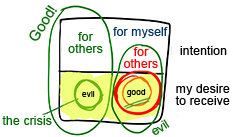What Are We Escaping?
 Baal HaSulam, “Introduction to The Book of Zohar,” Item 29: This is regarded as being under the Sitra Achra and the Klipot, whose role is to expand and enhance his will to receive and make it exaggerated and unrestrained in any way, to provide one with all the material he needs to work with and correct.
Baal HaSulam, “Introduction to The Book of Zohar,” Item 29: This is regarded as being under the Sitra Achra and the Klipot, whose role is to expand and enhance his will to receive and make it exaggerated and unrestrained in any way, to provide one with all the material he needs to work with and correct.
During the first phase of the correction when we are drawn to goodness, we discover evil. This revelation is necessary and so we have to prepare the environment and ourselves in advance in order to be able to bear it. We have to understand that this is the “matter” that we should correct and that its correction depends on the recognition of evil.
The point is not the suffering itself, but that we discover that the ego doesn’t let us bestow. I attribute the evil not to the unpleasant feeling that the desire brings about, but to the obstacles that it places on my way to unite with others and through them with the Creator.
This is the reason that the ego is called an “evil inclination.” On the whole, it can bring me pleasure and not troubles. Let’s take the seven years of satiety in Egypt for example, were they good or bad for the people of Israel? What if a person is detached from spirituality and under the domination of his ego? What if he knows that, is sure of that, and at the same time experiences pleasant feelings in his desire to receive, but feels bad in his soul?
Could it be that it is a sign of positive development? After all, despite the egoistic pleasures that I feel while I am in exile in Egypt under the domination of evil, the ego rules me and doesn’t allow me to advance towards spirituality, towards the Creator. Then comes another phase, when my ego begins to receive blows. Is this better? Is this easier?
On the one hand, yes, since the troubles of the ego enable me to escape it. On the other hand, it’s the ego that agrees to escape from Egypt because of the troubles and not in order to adhere to the Creator. In this case, my work is double: I have to rise above my egoistic feelings and use them as an accelerator for advancement.
Let’s draw this dilemma. Within my desire to receive I can experience either good feelings or unpleasant feelings (good and evil). If I feel good in Egypt and my intention is aimed at myself, then how do I assess the new state? If it’s according to the egoistic desire, then I feel good on the animal level. Then I do not intend to escape anywhere.
But what if I feel bad within my desire to receive? If I tie myself to this bad feeling, I’m in a general crisis, in a global crisis. If I understand that this bad feeling helps me aim my intention towards others, at bestowal, then I consider this state as good since it helps me advance just like Pharaoh brought the people of Israel closer to the Creator. No matter how bad it may be, there is a mitigating factor—the advancement towards the goal.

But at the same time, the desire I am in helps me assess the state I am in, and supports the decision. Let’s look at another option. I feel good, but I want to aim my intention towards others, at the Creator. Does this good feeling help me rise to Him? No. It turns out that this is a bad state (evil).

But I have grown stronger after “seven years of satiety” during which I felt good, and my intention was altruistic. Now comes a bad state, “seven years of hunger.” Do they help me on my way to the Creator?
On the whole the trouble of the egoistic desire can, on the one hand, raise me above it in an attempt to escape, when it’s easier for me to choose spirituality, and on the other hand, it can make my advancement more difficult. Why? The Torah tells us about a famine in the Land of Canaan that forced the sons of Jacob to go down to Egypt. They felt bad and they moved forward. In Egypt, they felt good at first, and then there were troubles again. So why did the evil that was revealed at the end of the exile help them leave it?
The answer is that when I feel bad, I have to treat it not as a bad feeling that pushes me in a certain direction and that’s it. No. I have to resist the evil and to check myself and what makes me escape. Do I escape because it hurts or because I want to reach bestowal?
Thus the evil requires double work. In a good state it’s hard for me to escape the goodness. But if after the goodness trouble comes, the level of difficulty rises. We escaped the troubles of Egypt in the past, and now I have to rise above the bad feelings and to feel the blows not from a bad life but from the domination of evil.
At first the domination of Pharaoh seemed good to the people of Israel, and now they feel bad because of it. And it isn’t because of despair; they are not hungry. Later they will complain when they remember the pots full of meat.
Today too, there are nations that are satisfied with a “full bowl,” and don’t care about their rulers, while others are so developed that they cannot put up with a hateful regime; even if it threatens them and despite all the material benefits, they feel a need to break free. Thus the desire to receive develops according to its four phases.
[82503]
From the 4th part of the Daily Kabbalah Lesson 7/9/12, “Introduction to The Book of Zohar”
Related Material:
Why Ethics Are Irrelevant
This One Is For Mommy
Fixing The “Flesh” Of Your Soul







Discussion | Share Feedback | Ask a question